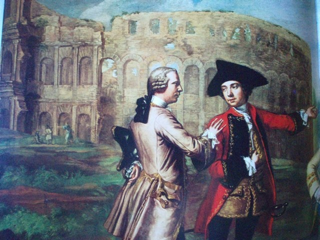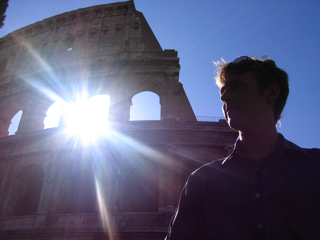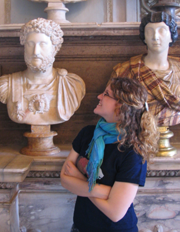Staging the City: Roman Performance, Power, and Identity from Empire to Enlightenment
Instructor: Odai Johnson / Lisa Schultz
Email: odai@u.washington.edu
Office: 109 Hutchinson
Office Hours: by appointment
Telephone: 543 5140
Roman Performance, Power, and Identity,
from Empire to Enlightenment
March 29-June 4, 2010
15 Credits
Extended Deadline: December 10, 2009

The School of Drama Department is thrilled to offer its first annual spring-quarter study abroad program in Rome, Italy that will fulfill 15 credits:
- Staging the City (Drama 494 - 5 credits)
- Art and Identity in Early Modern Rome
(Art H 497 - 5 credits) - Independent Project (Drama 499 - 5 credits)
Program Description
Using 1,500 years of performance traditions, literature, painting, sculpture and architecture, this broad humanities course considers how Rome created, maintained, and circulated its own image of imperial and cultural power - first as the heart of the Roman Empire, then as the capital of Catholic Christiandom, later as a city of Papal Princes, and the epicenter of high culture on any European tour. How Rome occupied its unique charismatic position in European history is largely a product of its own self-promotion. Rome the city invented Rome the ideal, and that act can be read as a powerful performance of civic identity. Combining the architecture of the city with plays, art, pageants, spectacles, gladiatorial games and opera, all staged to promote the values of Rome, we consider how the city fashioned its own identity as the center of power and culture from Classical Empire to the Enlightenment.

The program is conducted at the Palazzo Pio, the University of Washington's Rome Center, located in the historic center of the city. The palazzo, a fully remodeled seventeenth-century structure that sits on the foundations of the ancient theater of Pompey (55 B.C.), rises next to the Campo de' Fiori, one of Rome's favorite locales, a bustling open market during the day and lively social venue at night.
Program Staff
- Odai Johnson, Associate Professor of Theatre, Director of the School of Drama Doctoral Program
- Lisa Schultz, Lecturer of Art History
Course Descriptions
Staging the City
(Drama 494 – 5 credits)Johnson
This class considers the more performative aspects of creating Rome: theatre, spectacle, the Gladiatorial games and chariot races, the religious processions of saints and martyrs, papal processions, the Baroque fetes and opera, and the enduring improvisational art of commedia dell 'arte, from the 2nd century BCE to the close of the 18th century. These performances both produce Roman identity and are themselves products of that citizen-making process.
Art and Identity in Early Modern Rome
(Art H 497 – 5 credits)Schultz
This course explores the art and architecture, churches, palaces, and monuments produced by the city and its ruling families from Augustus to the late Baroque. No expense was spared in employing the greatest artists, architects, and sculptors to execute personal projects – from the first permanent theatres of antiquity to the papal palaces and tombs, the monumental architecture shaped not only the city, but shaped citizens within it. The art, architecture, and monuments of the city's layered past thus become the permanent markers of the staging of the power of Rome.

Independent Project
(Drama 499 - 5 credits)
Johnson/Schultz
Both classes culminate with a combined research project, independently generated and based in the student's area of interest. The student will work in consultation with either of the two professors to produce an independent research project on an area of their own interest. This will be shared with the class in the last week of the course.
Program Expenses
This program will cost approximately $5,200 per student. Course costs include living accommodations, complete use of the Rome Center facilities: students will have classroom and library use, a student lounge, computer lab, wireless access, ability to check out computer and A/V equipment, an in-house "movie theater" for screenings, and staff to assist them. Field trips and excursions, admission fees to all museums and exhibits, and some group meals are also included.
Course fee does NOT INCLUDE the required Rome Center Fee (approximately $2,200 for undergrads, paid in lieu of tuition to Student Fiscal Services by the regular winter deadline – a significant savings for those who would normally pay out-of-state tuition); an IPE concurrent enrollment fee ($250); airfare; food, and personal spending money.
Payment Schedule (including IP&E fee):
| Payment Type | Payment Amount | Payment Due Date |
| Program Deposit | $350 | Upon Acceptance |
| IPE Fee | $250 | Upon Acceptance |
| Program Fee | $500 | January 22, 2010 |
| Rome Ctr. Fee | $2,200 | April 16, 2010 |
| Program Fee Balance | $4,350 | April 16, 2010 |
| TOTAL | $7,650 |
*Rome Center Fee will be approximately $2,200 for undergrads and $3,200 for grads. Participants pay this fee in lieu of UW tuition.
IP&E will automatically charge student accounts for all program payments and fees.
The Financial Aid office can provide student loans for not only the cost of the course, but also travel, food, and other related costs. Short-term loans are also available to cover pre-travel expenses. A limited number of scholarships will be available through the IP&E Office. See also: http://www.goglobal.washington.edu/apply.php

Refund Policy
A $350 deposit and the $250 IPE fee are required at the time of acceptance. This $600 deposit is non-refundable. Any student withdrawing after January 22, 2010 will be liable for a percentage of the program fee, depending on the date of withdrawal. No part of the $5,200 fee is refundable once the program has begun. Notice of withdrawal from the program must be made in writing to the School of Drama and to the office of International Programs & Exchanges.
Travel
To Rome:
Participants are responsible for making their own travel arrangements to and from Rome. Act quickly to reserve the lowest fares; you may wish to explore budget fares offered on websites such as Travelocity and Expedia, as well as Council Travel on the Ave.
Within Italy:
Students and instructors will take an overnight trip to Venice. We will also be making a day-excursion to Pompeii and Herculaneum. The program fee covers these group travel expenses. Students are responsible for their own individual local transportation. Students will also have opportunities to travel on their own for two or three day-jaunts.
All participants must have a passport that is valid for not only for the duration of the program, but for 6 months after the program ends. It may take as long as six weeks to obtain or renew a passport.

Application Instructions
If you are interested in the Drama program in Rome, please fill out the online application.
Extended Deadline: December 10, 2009
The Rome faculty and the School of Drama will determine final acceptance.
Questions?

General questions about topics such as graduation requirements, financial aid and course content inquiries should be directed to Odai Johnson (odai@u.washington.edu) or Lisa Schultz (lschultz@u.washington.edu).